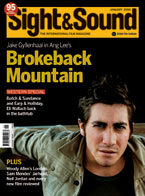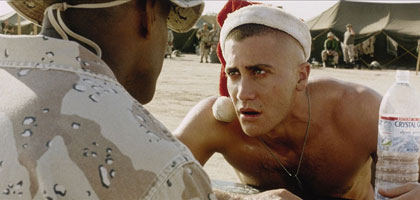Primary navigation


Don't expect any grand statements from Sam Mendes' new movie about the tedium of being a marine during Operation Desert Storm. By Leslie Felperin
Anthony Swofford (Jake Gyllenhaal), our hero of sorts, observes near the end of Jarhead, Sam Mendes' quizzical, visually striking and ultimately glib film about the Gulf War of 1991, that "Every war is different; every war is the same." Such paperback Buddhism could be applied to war movies themselves: they are all the same (young men, guns, stuff about heroism) and they are all different, as new wars come and go and new film-makers emerge and move on. Appropriately given the above, Jarhead is simultaneously audaciously original and so mired in the clichés it knowingly acknowledges, sends up and honours that it has little new to say.
Readers are welcome to write in and correct me, but I reckon this may be the first film set in a war zone in which none of the central characters ever fires his gun in anger or gets killed by the enemy. Thus, at the very least, the movie reflects the relatively small number of casualties suffered by US troops during Operation Desert Storm, a loss of less than 500 souls by most reckonings, only 147 of whom were killed in battle.
Most conventional war movies structure themselves around action scenes sculpted to deliver thrills, tension and, post-Vietnam, horror-inducing visions of the brutality of combat. Instead, boredom and disappointment are the keynotes here. Jarhead's plot is made up of a series of non-events, moments when Swofford and company almost shoot something but don't, are almost shot but aren't, interspersed by long stretches when they kill time and wait, going quietly crazy in the desert, frustrated by their lack of opportunities to do the two things they've been so assiduously trained for: to fight and to die. One of the film's finest bits of acting comes from Peter Sarsgaard as Swofford's sniping partner Troy, who finally loses it big time when their first and only chance to take a shot at an Iraqi is thwarted by an officer's plan to take out the target with an air strike instead. Troy's hysterics are the kind usually only shown in war films after a buddy has been slaughtered or a village wiped out. But here he's distraught because he's been stopped from killing.
The film's press notes emphasise the amount of advice taken from military personnel and the use of formerly active military bases for location shooting. No doubt most other big-budget, war-themed Hollywood movies of recent vintage would make similar claims, but Jarhead's makers are so invested in capturing what it felt like to be a soldier in the first US-Iraq conflict that the film becomes little more than a swirl of incident caught by Roger Deakins' bleached-out and stylish cinematography.
What saves it from being dull is its humour. A mid-section montage sequence, for instance, amusingly illustrates the tedium of Swofford's STA (Surveillance and Target Acquisition) platoon's month-long wait in the desert, summed up in the voiceover with a listing of 'activities' used "to deal with loneliness": "hydrate", "crying", "masturbate", "debate differences between Cuban vs Puerto Rican women", "masturbate" and "hydrate" again.
Swofford's incessant voiceover is characterised by a curious mix of sentiment and irony. Much of it is lifted directly from the chronologically fractured Gulf War memoir of the real-life marine after whom the film and its hero are named. The film follows the source material closely without being slavish. There's a slippage between the Swofford of the memoirs, who for all his fondness for Camus and insight into why he and his mates are in the Gulf is as gung-ho as the next grunt, and Gyllenhaal's smart-alec kid of the movie. The latter is part Yossarian-style wise guy, part a failed frat boy who ended up in the marines because, as he tells his drill sergeant in one of the movie's opening scenes, he "got lost on [his] way to college."
There is an inevitable loss of depth in any transfer of a book to the screen, but Jarhead's script, by one-time marine William Broyles Jr (who served in Vietnam and recently wrote the screenplay for The Polar Express), is faithful to the memoir's refusal to comment on the war's justice, deliver grand statements or engage directly in political debate. Both book and film aim simply to show what it was like to be stationed amid all that muddle and mucking around. This lack of a big statement may be what has garnered the film middling-to-negative reviews from critics in the US, who would have preferred it to take a stand - any stand - on military interventions past and present. The closest the movie comes to a throw-forward to current events is to have Swofford intone solemnly at the end: "We are still in the desert"- a metaphor for how the desert captured the souls of his brothers-in-arms as well as an oblique reference to the contemporary occupation of Iraq.
Cynics might suspect that the film's uncritical approach is motivated less by a desire to be faithful to the personal experience of Swofford and his buddies than by a wish to avoid upsetting the paying public and the Academy voters who have been so generous to Mendes in the past. But perhaps its refusal to recycle the same old 'war is hell' platitudes is to the movie's credit. In fact Jarhead is most interesting when it's illustrating how other war movies mediate the experience of soldiers, and how these films are reappropriated and gleefully 'misread' to serve different ends. Midway through we see Swofford and Troy at their training camp's cinema watching the 'Ride of the Valkyries' sequence from Apocalypse Now; they whoop and holler with delight every time there's a strike, in defiance of the received wisdom that Francis Ford Coppola's movie is the big kahuna of anti-war films. (There's an extra irony in the fact that Jarhead and Apocalypse Now share the same sound editor, Walter Murch, whose work here is typically excellent.) Later the platoon settles down to watch a VHS copy of that other supposedly coruscating exposure of war's pernicious effect on the human soul, The Deer Hunter; sent by the wife of one of the marines, the film is interrupted during its opening credits by a DIY porn movie intended to humiliate the recipient.
At one point music by the Rolling Stones and the Who blasts out over the desert-compound tannoy, and Swofford complains mildly that even the soundtrack for 'his' war is a leftover from Vietnam. (Although we also hear music of the time by acts such as Public Enemy and Bobby McFerrin.) To illustrate the fact that the imaginations of its characters have been colonised by previous war movies, Jarhead features a constant stream of visual references to such films - particularly the darker ones, including Full Metal Jacket, MASH and Platoon. It's quite likely that while they were researching the film Mendes and his team watched Lessons of Darkness, Werner Herzog's astounding documentary about Kuwait's burning oil fields, which leaves its mark not just in Jarhead's rendition of the ecological disaster of the war, but also in its weird, Stygian visual poetry: the desert sand turns sticky black, surreal horses appear from nowhere, and a marine, prompted by the downpour of burning crude, remarks: "The earth is bleeding." The film is at its best when it lets such images speak for themselves, as with a sequence showing charred bodies on the so-called 'Road of Death' out of Kuwait.
With the notable exceptions of David O. Russell's superior but still flawed Three Kings, Edward Zwick's oblique Courage under Fire and a handful of minor others, hardly any films have dared to tackle the first Gulf War. It famously took Hollywood several years to start making movies about Vietnam and there was an 11-year gap between the jingoistic The Green Berets of 1968 and Apocalypse Now: old-timers remember how the latter reopened wounds caused by a conflict which many in the country still wanted to forget.
If nothing else, Jarhead provides some kind of reportage of a war whose consequences we haven't yet begun to understand, a war now elbowed into history by its still-raging sequel. But given how poorly Mendes' movie has been reported on in the media, one despairs to think how long it might be before Hollywood dares to engage honestly with the current conflict.